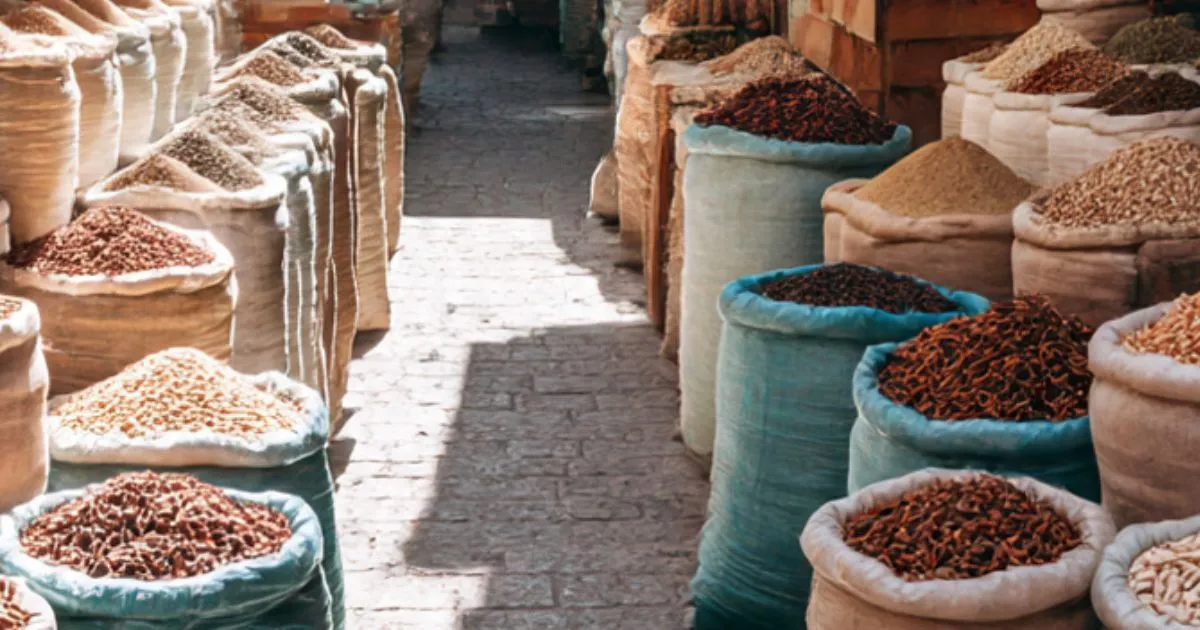Souq Al-Mujahideen: Your Ultimate Guide to Medina’s 50-Year-Old Hidden Market
Table of Contents
Souq Al-Mujahideen: Your Ultimate Guide to Medina’s 50-Year-Old Hidden Gem
Souq Al Mujahideen is not just a market; it’s a living, breathing chronicle of Medinan life. Tucked away in the holy city, this historic marketplace has been the go-to destination for locals for over half a century. For travelers and pilgrims looking to experience authentic Saudi culture beyond the mosque courtyards, Souq Al Mujahideen offers an unfiltered, vibrant, and unforgettable journey into the heart of the city’s traditions.
If you want to find products that tell a story—artisanal cheeses, pure ghee made by local families, and spices that carry the scent of the Arabian desert—then this is your destination. This comprehensive guide will walk you through everything you need to know about navigating this iconic market.
Table of Contents
- A Walk Through History: The Legacy of Souq Al Mujahideen
- What to Buy: A Treasure Trove of Authentic Goods
- 2.1. The Liquid Gold: Samin (Ghee) and Butter
- 2.2. Grains, Flour, and Traditional Staples
- 2.3. Dates and Sweet Delights
- 2.4. Beyond Food: Spices, Perfumes, and More
- Meet the Sellers: The Heart and Soul of the Souq
- Practical Visitor’s Guide: Tips for Your Trip
- Conclusion: More Than a Market, It’s an Experience
1. A Walk Through History: The Legacy of Souq Al Mujahideen
Stepping into Souq Al Mujahideen is like stepping back in time. While the exact founding date is debated among the elders, the market is confidently stated to be over 50 years old, with some vendors believing it could be as old as 70 or 80 years. This makes it one of the most ancient and established traditional markets in all of Medina.
The market’s name is deeply rooted in the community. It is named after the adjacent Masjid Al-Mujahideen (The Mosque of the Mujahideen). As the city grew and automobiles became common, vendors began to gather in the area surrounding the mosque. What started as a small, informal gathering of sellers evolved into the permanent, bustling hub it is today. Locals simply began calling it Souq Al Mujahideen, and the name stuck, forever linking the market to its spiritual neighbor.
2. What to Buy: A Treasure Trove of Authentic Goods
The real magic of Souq Al Mujahideen lies in its incredible variety of authentic, high-quality products. This is where you come to find the true taste of Saudi Arabia, direct from the farms and artisans.
2.1. The Liquid Gold: Samin (Ghee) and Butter
If there is one item Souq Al Mujahideen is famous for, it is samin (clarified butter). This is not a mass-produced product; it’s a artisanal good, with each vendor often sourcing from specific families or farms known for their quality.
- Types of Samin: You will find several varieties:
- Sheep Samin: Often considered the classic, rich and flavorful.
- Cow Samin: Some sellers, like the knowledgeable vendor at one stall, even argue that their cow samin is superior in quality and taste to the sheep version.
- Camel Samin: A less common but highly valued type.
- Purity is Key: The best samin here is pure, without any added spices or preservatives. As one seller emphasized, “This is pure, every household makes their own, and each has its own customers.”
- Price Range: Prices can vary based on type and brand, ranging from 50 SAR to 150 SAR per kilogram. Popular brands you’ll encounter include Al-Mortada and Al-Mukhtar.
- Butter (Zibda): Also available is fresh butter, separated into yellow butter (considered a higher grade) and white butter, sold for around 30-35 SAR for two kilograms.
2.2. Grains, Flour, and Traditional Staples
For those seeking organic and traditional staples long before they became a global trend, this souq is a paradise.
- Flour (Tahin): You can find whole wheat flour from the Al-Qassim region, explicitly advertised as being produced without chemicals.
- Dukhn (Millet): This nutritious ancient grain is available in white varieties, sold by the kilo or half-kilo. It’s a staple in traditional Bedouin cuisine.
- Madheer (مضير): A unique product you might encounter is Madheer, a type of frozen or preserved milk that is shaped into blocks. It’s a traditional Bedouin product, made from sheep’s milk and a true taste of the desert.
2.3. Dates and Sweet Delights
Being in Medina, the city of dates, it’s no surprise that Souq Al Mujahideen is a premier destination for this holy fruit.
- Varieties: From the prized Sukkari (سكري) dates to crushed dates for cooking, the choices are vast. One vendor sells a thick, luxurious date syrup called Rab (رب), which is so dense it can be used as a honey-like sweetener or spread.
- Wholesale Heaven: The market is a major wholesale hub. You can buy dates by the crate, by the box, or even by the piece from some friendly vendors.
2.4. Beyond Food: Spices, Perfumes, and More
The sensory experience of Souq Al Mujahideen extends far beyond taste.
- Spices and Coffee: Stalls are overflowing with sacks of vibrant spices (abzar), traditional Daqqa mixes, and freshly roasted coffee beans from regions like Jizan, including specialty types like Jebily and Khulani.
- Oils and Honey: Look for sesame oil from southern Saudi Arabia and authentic, original honey, which can command prices around 350 SAR for half a kilo.
- Traditional Clothing and Goods: Surprisingly, you can also find traditional fur coats (farooh), jackets, and beautifully hand-woven palm frond baskets used for storage.
3. Meet the Sellers: The Heart and Soul of the Souq
The vendors are the soul of Souq Al Mujahideen. They are knowledgeable, proud of their products, and often represent generations of expertise.
- Fawaz bin Salim Al-Jabri: At his stall, you’ll find a man passionate about his pure, unadulterated samin and traditional products like Madheer.
- The Wholesale Date Seller: This vendor exemplifies the market’s hustle, selling everything from individual date pieces to full crates, making high-quality products accessible to all.
- The Elderly Female Vendors: Scattered throughout the market, these women sell an array of traditional herbs, oils, and samin, offering a direct link to the Bedouin heritage of the region.
- Abu Hussein’s Shop: A treasure trove of unique items, from Jordanian oil (Tweek) to the dense date Rab, all explained with the pride of a master craftsman.
4. Practical Visitor’s Guide: Tips for Your Trip
To make the most of your visit to Souq Al Mujahideen, a little planning goes a long way.
- Best Day to Visit: The market is at its absolute peak on Fridays. This is when the widest variety of vendors and products are available.
- Best Time to Visit: For the full experience with the most energy, go in the late morning or afternoon on a Friday. However, be prepared for crowds. If you prefer a quieter visit, a weekday might be better.
- Bargaining: While prices are generally fair, especially for the quality, there can be some flexibility, particularly when buying in bulk. Don’t be afraid to ask for a better price if you’re purchasing multiple items.
- Cash is King: Ensure you have plenty of cash (Saudi Riyals) on hand, as many smaller vendors may not accept credit cards.
- Family-Friendly: The market is frequented by local families and women, so it is a comfortable environment for all visitors.
For more information on planning your visit to Medina, you can check the official Saudi Tourism Authority website.
Conclusion: More Than a Market, It’s an Experience
Souq Al Mujahideen is far more than a place of commerce. It is a vibrant cultural institution that has preserved the authentic flavors and crafts of Saudi Arabia for generations. It’s the scent of pure samin, the vibrant colors of spices, the rough texture of a hand-woven basket, and the warm smile of a seller explaining his family’s trade.
To walk through its alleys is to understand the true soul of Medina—a city that beautifully balances its profound spiritual significance with a rich, grounded, and welcoming daily life. A visit here isn’t just about what you buy; it’s about the memories you make and the stories you bring home.
Visit Our Activities Pages for More Activities in Madinah

